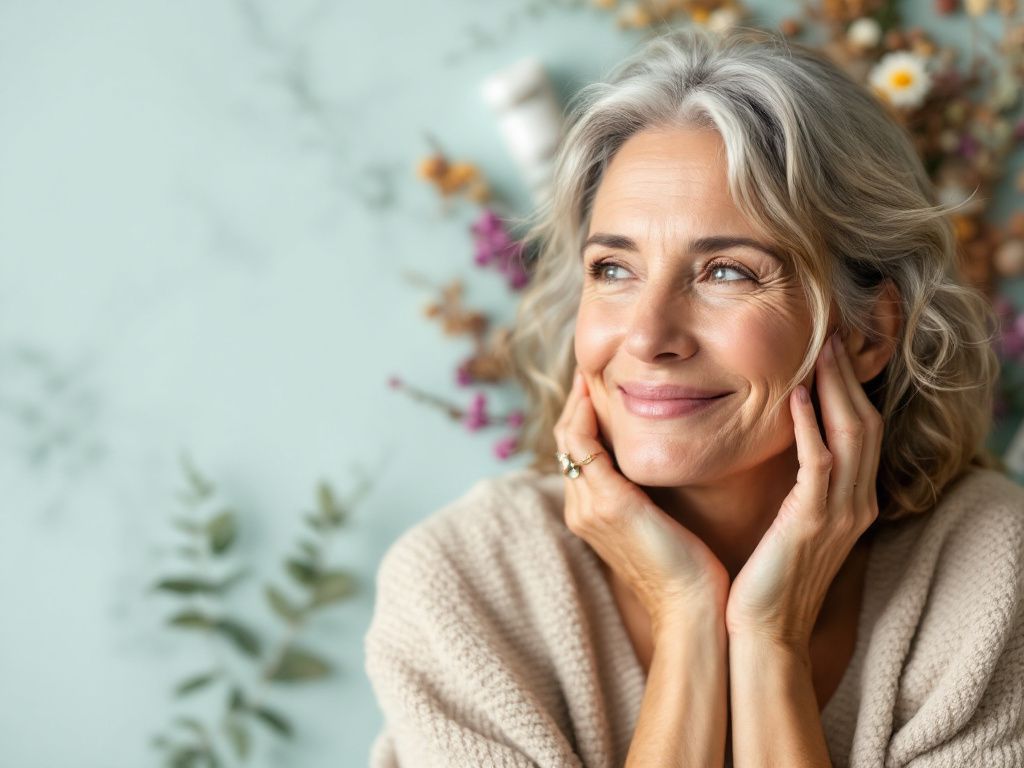
Hey there! So, you’ve noticed your hair is doing some, let’s call them ‘acrobatic moves’ lately, and you’re wondering why. Or maybe you’re chatting with pals and the topic of menopause hair changes comes up. Either way, you’re not alone, and it’s time to delve into this hairy situation. Let’s talk about the changes you might notice, why they’re happening, and yes, what you can do about it.
Why Does Menopause Impact Your Hair?
Picture this: you’re on a rollercoaster ride, but instead of thrilling ups and downs, it’s your hormones going haywire. Menopause brings drastic shifts in hormone levels, and these fluctuating hormones—especially estrogen—take your hair along for the ride. Estrogen does more than you might have realized; it plays a key role in maintaining healthy hair.
When estrogen dips during menopause, its hair-loving benefits diminish. Lower estrogen levels can lead to hair thinning—definitely, one of the menopause hair changes that might catch your attention. While some notice just subtle thinning, others might experience shedding. So, what’s the culprit? Essentially, those hormonal changes make the hair transition from growth phases into shedding phases faster than usual.
The Phases of Hair Growth (A Quick Aside)
Hair grows in cycles—just like life with its coffee phases, cat phases, and so on. Here’s a quick rundown:
- Anagen Phase: The growth end of the yarn. It can last ages—years—until menopause speeds this part up.
- Catagen Phase: Like a commercial break. This transitional phase stalls growth but just temporarily.
- Telogen Phase: The resting phase. Picture hair kicking back on a beach and contemplating its purpose until it decides it’s had enough relaxation and falls out.
It’s these last two phases that menopause nudges into high gear, leading to that dreaded (or at least melodiously termed) ‘hair fall.’
What Menopause Hair Changes Should You Expect?

Alright, so aside from a bit of shedding, what else can make its prized appearance on your scalp? Here are some contenders for that menopausal hair ‘do:
- Thinning Hair: The usually lush forest becomes a lighter grove. You might feel your braid isn’t as hefty or see more scalp on humid days.
- Texture Changes: Once silken waves turning more… wiry? Hormones can cast strange spells, leading to hair feeling drier or less manageable.
- Graying Hair: While this one doesn’t whisper “menopause” as loudly, it’s worth noting that the cocktail of aging and hormone shifts can trigger an early party for salt over pepper hair.
Honestly, all these changes can be a bit unsettling, like the first crinkle in your favorite old paperback. Let’s roll up our metaphorical sleeves and chat about taking charge back with some well-aimed strategies.
Managing Menopausal Hair Changes: Practical Tips
Now onto the ‘what-to-do’ bit, and trust me, I’ve got you covered. Here are some tried-and-true, friendly-style ways to help those locks feel a bit more locked down and less flighty.
Nourish from Within
You probably saw this coming. What you eat matters. Think of your hair as an army of thousands of tiny soldiers—unbelievably tiny, like dine-and-dash fairies—all depending on nutrition delivered straight from your fork. Focus on:
- Protein: Essential for fortifying the hair structure—those fairy footsoldiers of keratin need their marching proteins.
- Iron & Zinc: Important for cell reproduction and repair. You want those follicles in tip-top condition, don’t you?
- Omega-3 Fatty Acids: These jewels help nourish your hair and keep it looking shiny.
Include these nutrients in your daily meals for stronger, more resilient hair. Trust me, a veggie stir-fry here, a salmon feast there, and your locks will thank you. Check with your doctor if you think supplements are the way to go.
A Thought on Stress (The Uninvited Guest)

Zoom meetings, grocery lines, and oh, that minor life change called menopause. Stress doesn’t help, so managing it aids not just your heartbeat but also your hairline.
Practices such as:
- Meditation: Helps keeping you zen-like, which can slow down hair loss.
- Yoga: Done for fitness and the occasional upside down poses—let’s call it hair circulation promotion!
Gentle Hair Care
- Sulfate-Free Shampoos: Harsh shampoos often strip your hair of natural oils. Choose something gentle, specifically formulated for mature hair.
- Skip the Daily Wash: Everyone needs a break, even your hair. Frequent washing can exacerbate dryness.
- Wide-Tooth Comb: The tender-lovin’ care for your hair. Switch to a wide-tooth comb or a soft-bristle brush to reduce breakage.
Style with a Light Touch
You don’t need to break up with your straightener, but maybe see less of it? Heated styling tools suck moisture from your hair, contributing to brittleness. Use lower heat settings and limit their use.
Scalp Care Time
We often forget our scalps. But trust me, they’re more than just a landing ground for your favorite hat: healthy scalp, good focus! Massaging rises to the top of hair-friendly routines:
- Scalp Massages: Increase blood flow with a few minutes every day. Add a natural oil, perhaps coconut or jojoba, for extra might.
Helpful Professional Interventions

Desperation sometimes calls for hair-to-hair combat. That’s when professional help leaps into action:
Dermatologists vs. Trichologists: Who Ya Gonna Dial?
- Dermatologists: Ideal for tackling the health of skin, scalp, and hair combined.
- Trichologists: Hair scientists extraordinaire. They navigate wards of hairy exploits often lost on the classic salons.
Key Takeaways Your Hair Would Love to Bookmark
So let’s round back to those key takeaways:
- Embrace Balance over Perfection: Your hair, like any relationship, will have ups and downs; focus on adaptations that make it healthier overall.
- Nourish from Inside Out: Consider daily nutrition as the lifeline to each strand’s vitality.
- Riding the Change Wave: Accept transition as an inherently bumpy but surmountable aspect of menopause.
- Lean Towards the Gentle: Both in hair care products and treatments—everything helps.
- 5. **Consult Professionals as Needed: It’s okay to ask for directions on this journey of follicular evasions.
Stay curious and loving towards yourself and your tresses during this stage of life. Menopause hair changes are ritually shared over coffees, though perhaps not idealized. Navigating the unruly terrain of menopause is indeed a process. It’s a time of life marked by a new kind of wisdom, choosing to temper expectations with care, understanding, and a inch of humor.
That said, go forward and arm yourself well! You’ve got an amazing road ahead. And don’t forget, at the day’s end, you’re more than the sum of your highlights—or possible loss of them. Here’s to discovering yourself anew right between those strands!
Frequently Asked Questions
How do hormonal changes during menopause affect hair?
During menopause, the decline in estrogen levels significantly impacts hair health. Estrogen helps keep hair in the growth phase, and its decrease allows androgens (male hormones) to become more influential, leading to shorter growth phases and longer resting phases. This results in hair thinning, loss of volume, and changes in hair texture[1][2][5>.
What are the common hair changes women experience during menopause?
Common hair changes include hair loss, thinning or loss of volume, dry and dull hair, a dry and sensitive scalp, weaker and brittle strands prone to breakage, and changes in hair texture. Some women may also notice their hair becoming finer or even changing from straight to curly[1][3][5>.
How can I manage and mitigate menopausal hair changes?
To manage menopausal hair changes, it is recommended to eat a nutrient-rich diet, use gentle hair care products, reduce damaging styling practices like excessive heat styling or tight hairstyles, and consider supplements that promote hair growth. Additionally, using stimulating and anti-androgenic scalp treatments can help[1][3][4>.
Can Hormone Replacement Therapy (HRT) help with menopausal hair thinning?
HRT can be beneficial for some women, as it helps restore estrogen levels, which can improve hair growth and reduce thinning. However, the effectiveness of HRT on hair varies, and it is important to consult with a healthcare provider to determine the best approach for individual cases[4][5>.
References


Leave a Reply